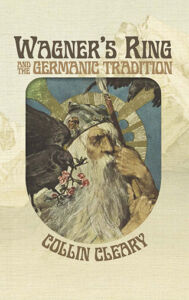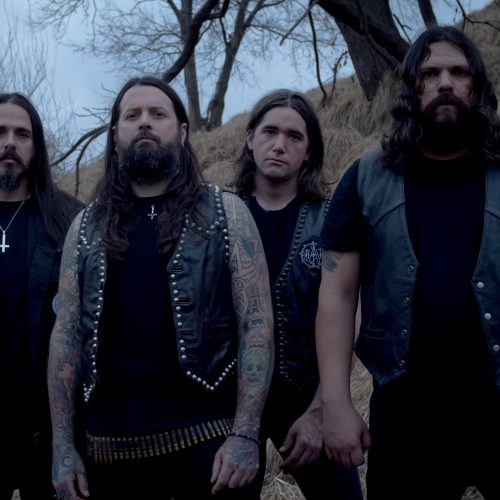The famed Ukrainian black metal band Drudkh has returned. All Belong to the Night (“Всі Належать Ночі”), released on Friday, is Drudkh’s first studio album in four years and one of its strongest albums to date. Its potent blend of sorrow and defiant aggression provides a fitting soundtrack to the Ukrainian people’s fight against Russian imperialism.
Founded in Kharkiv in 2002, Drudkh is one of the most prominent bands in the Ukrainian black metal scene. Its music primarily draws on its members’ Ukrainian heritage. Many of Drudkh’s albums contain lyrics by Ukrainian poets, including Taras Shevchenko, Oleksandr Oles, Ivan Franko, and Oleh Olzhych. Drudkh has also been heavily influenced by Ukrainian folk music and is known for combining folk-like melodies and rhythms with black metal (a few examples: “Sunwheel,” “Distant Cries of Cranes,” and “Furrows of Gods”). The album Songs of Grief and Solitude is entirely comprised of acoustic folk music.
All Belong to the Night storms out of the gate with “The Nocturnal One” (“Нічний”), whose harrowing lyrics are taken from Ukrainian poet Yakiv Savchenko’s “The Victims of the Nocturnal One.” Savchenko, like many other Ukrainian writers, artists, and intellectuals of his generation, was arrested and executed by Stalin in 1937. Thurios’ tortured screams are a perfect match for Savchenko’s verse. Yet “The Nocturnal One” is not all “doom and gloom.” The blast beats and surging guitar part give it forward momentum and a sense of perseverance, and the crystalline, bell-like sounds toward the beginning suggest a glimmer of hope. Of all the songs on the album, this one best captures the situation in Ukraine. Drudkh released an edited version of this track two days after the Russian attack on Ukraine as a symbol of Ukrainian resistance.
The second track, “Windmills” (“Млини”), conjures the image of a desolate, windswept Eastern European village in the middle of winter. It opens with a mysterious chant sung by male voices and segues into brutal walls of sound and vocals drenched in despair. The influence of folk music is most apparent in this song, especially in the middle section. “November” (“Листопад”), the subsequent track, intersperses a down-tempo riff with heavier passages. Befitting the title, it has a melancholy, autumnal feel.
“Till We Become the Haze” (“Поки Зникнем у Млі”), the final track, is the most varied song on the album. At 15 minutes in length, it is also the longest. It opens with a brooding tremolo-picked riff over blast beats followed by a more mid-tempo section, then enters a pensive mood, with a mournful melody reminiscent of neofolk followed by fuzzy chords undergirded by a pedal point. After a few seconds of silence, the song begins to go in a more progressive direction and gradually builds up to a virtuosic drum solo in a satisfying climax. It concludes with the slower motifs introduced in the first half.
Drudkh has been the subject of some controversy, as two of its members belong to the band Hate Forest, which has been associated with NSBM (National Socialist Black Metal). In response, Drudkh has distanced itself from the NSBM scene and political ideologies in general. Instead, it claims to stand for “individualism, self-improvement, and estrangement from modern values.” Of course, “estrangement from modern values” is hardly at odds with Right-wing politics.
Similarly, Ukrainian NSBM band Nokturnal Mortum, another titan of Ukrainian black metal, has disavowed the NSBM scene and has claimed to be apolitical but continues to perform at festivals like Asgardsrei. It is safe to assume that neither Nokturnal Mortum nor Drudkh has denounced the radical Right entirely.

You can buy Collin Cleary’s Wagner’s Ring & the Germanic Tradition here.
Drudkh’s deep commitment to Ukrainian nationalism is obvious and is hardly divorced from real-world politics. Blood in Our Wells was dedicated to Stepan Bandera, and the final track of the album is entitled “Ukrainian Insurgent Army,” after the Ukrainian nationalist paramilitary formation led by Bandera. (Additionally, Microcosmos samples the soundtrack of Atentat [1995], a film about Bandera’s assassination.) More recently, Drudkh has used the profits from its music and merchandise to purchase equipment for the Armed Forces of Ukraine.
Drudkh’s music speaks for itself. In his review of Microcosmos, Twitter gadfly Noah Berlatsky panics that “this is music to murder modernity by.” He is correct in discerning that while Drudkh is not overtly political, it draws from a Right-wing, nationalist milieu; moreover, the political undercurrents in Drudkh’s work cannot be disentangled from the music itself because they are precisely what give the music its power.
Atmospheric black metal can be hit-or-miss: Its focus on atmosphere and mood over melodic and thematic development can end up being either hypnotic or soporific. In All Belong to the Night, Drudkh succeeds in making music that is genuinely engrossing despite its limited melodic material. There is plenty of variety, and the music never strays into monotony. The creative drumming, a stand-out feature of nearly every Drudkh album, also goes a long way in spicing things up. My only gripe with this album is that the mix (as with Handful of Stars) often feels two-dimensional. Overall, though, All Belong to the Night is a great album. Autumn Aurora and Blood in Our Wells remain Drudkh’s best albums, but All Belong to the Night is easily Drudkh’s best since Microcosmos.
* * *
Like all journals of dissident ideas, Counter-Currents depends on the support of readers like you. Help us compete with the censors of the Left and the violent accelerationists of the Right with a donation today. (The easiest way to help is with an e-check donation. All you need is your checkbook.)
For other ways to donate, click here.
Enjoyed this article?
Be the first to leave a tip in the jar!
Related
-
Stalin’s Affirmative Action Policy
-
Notes on Plato’s Alcibiades I Part 1
-
Counter-Currents Radio Podcast No. 582: When Did You First Notice the Problems of Multiculturalism?
-
James M. McPherson’s Battle Cry of Freedom, Part 2
-
Right-Wing Values in the Halo Series
-
Looking for Anne & Finding Meyer, Part 3
-
Looking for Anne and Finding Meyer, Part 2
-
Looking for Anne and Finding Meyer, Part 1


3 comments
Thanks a lot for this review. I really like Drudkh’s music, their lyrics, CD covers, colors and themes. From this kind of Black Metal I respect also Temnozor, Kroda, Nokturnal Mortum, Khors, Blood ov Kingu… Do you know the academic article about Drudkh by Smierc Polastern on Politosophia website? https://politosophia.org/page/drudkh-s-anthology-of-time.html
You write interesting articles about things that interest me. Could I interview you for Counter-currents?
I always enjoy the occasional black metal coverage here at counter currents. I’ve recently been getting into Drudkh’s music for the first time and I’ll have to check out this new album.
Nokturnal Mortum’s Voice of Steel is the one album I’d most recommended for black metal done beautifully to perfection. Simply put, it’s mesmerizing and ‘Ukraine’ should be their country’s national anthem. Verity and The Spirit Never Dies split with Graveland are quite good as well.
Comments are closed.
If you have Paywall access,
simply login first to see your comment auto-approved.
Note on comments privacy & moderation
Your email is never published nor shared.
Comments are moderated. If you don't see your comment, please be patient. If approved, it will appear here soon. Do not post your comment a second time.